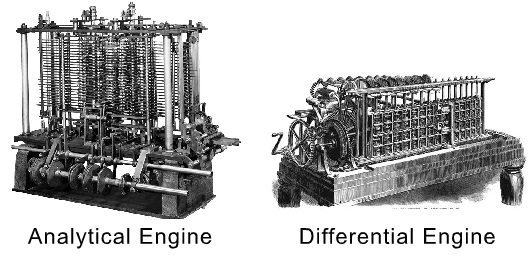“Who invented the first computer?” is not an answer to be replied in one word or name and you are sorted, the answer is not depends on single machine, computer is made up collection of different parts, each part is a separate invention and it’s separate inventor. So the answer depends on different classification of computers.
We’ll be covering the following topics in this tutorial:
History and Evolution of Computers
As we know in 19 century Charles Babbage the famous Mathematics professor had its beginning. He designed Analytical Engine (first mechanical computer) successor of the Difference Engine (automatic mechanical calculator) which is known as a basic framework for today’s computer. It is classified into generations and each generation is the improved and modified version of it.
In 1822, British mathematician and inventor Charles Babbage (1791-1871) built the steam-powered automatic mechanical calculator what he called “Difference Engine” or “Differential Engine”. It was more than simple calculator. Which is capable of computing several set of number and in result it gives hard copies. Ada Lovelace helped Charles Babbage in development of difference engine. It computes polynomial equations and print mathematical tables automatically.
In 1837, Charles Babbage built the first description of a general mechanical computer, which was the successor of the Difference Engine what he called analytical engine, but never completing while Babbage was alive. It was programmed to using integrated memory and punch cards.
In 1991, Henry Babbage, Charles Babbage’s youngest son complete a portion of the machine that perform basic calculations.

Who Invented the First Electronic Digital Computer?
At university of Pennsylvania J. Presper Eckert and John Mauchly invented ENIAC (Electronic Numerical Integrator and Computer) in November of 1945, it was design and construction was financed by the US military. It was occupied 1800 square feet, 200 kilowatts of electric power, 70,000 resistors, 10,000 capacitors and 18,000 vacuum tubes where used and its weight was almost 50 tones. Although ABC computer was the first digital computer but many still consider the ENIAC was the first digital computer, because it was first operational electronic digital computer. It was used for weather prediction, atomic-energy calculations, thermal ignition, and other scientific uses.
Who invented the first programmable computer and where?
In 1938, German civil engineer, Konrad Zuse built world’s first freely programmable binary driven mechanical computer what he called Z1. Konrad Zuse has considered the inventor of the modern computer. It was programmable via punched tape or punched tape reader.
Z1 original name was “V1” for VersuchsModell 1, after World War 2 it renamed “Z1”. It consisted of about 1000 kg weight with thin metal sheets with 20000 parts.
Who invented the first commercial Computer?
In 1951, the first commercial computer that handle both numerical and alphabetic and produced in the US what he called UNIVAC I (Universal Automatic Computer I). It was designed by J. Presper Eckert and John Mauchly, Who was the inventors of ENIAC. It was a vacuum tube, limited speed of memory computer that was used by US military and its input and storage was magnetic tape or a magnetic drum.
UNIVAC I was consume 125 kW of electric power, 5,000 vacuum tubes, 1,905 operations per second, and 18,000 vacuum tubes where used and its weight was almost 16,000 pounds.
When was the first personal computer invented?
The first personal computer was introduced in 1975. Ed Robert coined the term “personal computer” and PC appeared in a 3 November 1962 when Altair 8800 was introduced. Early computers generally called microcomputers.
First computer was invented by company name
Commodore: In 1977, Commodore introduced its first computer, the “Commodore PET“.
Compaq: In March 1983, Compaq released its first computer and the first 100% IBM compatible computer, the “Compaq Portable“.
Dell: In 1985, Dell introduced its first computer, the “Turbo PC“.
Hewlett Packard: In 1966, Hewlett Packard released its first general computer, the “HP-2115“.
NEC: In 1958, NEC builds its first computer, the “NEAC 1101“.
Toshiba: In 1954, Toshiba introduces its first computer, the “TAC” digital computer.
 Dinesh Thakur holds an B.C.A, MCDBA, MCSD certifications. Dinesh authors the hugely popular
Dinesh Thakur holds an B.C.A, MCDBA, MCSD certifications. Dinesh authors the hugely popular